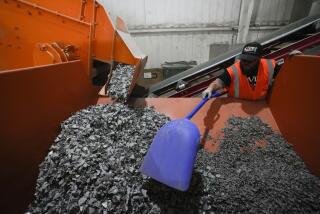The Cutting Edge: COMPUTING / TECHNOLOGY / INNOVATION : Integrating Old PCs Back Into Society : Computers: Companies are refurbishing and reselling used equipment--and helping the environment in the process.
- Share via
Paul Baum is a firm believer in reincarnation--for computers, that is.
Since Baum founded Rumarson Technologies Inc. four years ago, he estimates he has kept more than a million PCs out of landfills by refurbishing and reselling used computers and by recycling the components of machines that are no longer salvageable.
The refurbished computers--dubbed “Nused,” short for “newly used”--are now carried by more than 30 mass-merchandise chains and independent retail stores nationwide. The Nused PCs--brands such as IBM, Packard Bell and AT&T--are; expected to put $15 million into Rumarson Technologies’ coffers by the end of the year.
Some major computer manufacturers, such as Dell Computer Corp., remanufacture and resell their own computers, usually in foreign markets. But smaller companies such as RTI are expected to play a much greater role in keeping older personal computers on desktops instead of in trash heaps.
“This industry is in its infancy and it’s growing very rapidly,” said Dutch Haagsma, president of the asset recovery services division of Irvine-based Aurora Electronics, which recycles integrated circuits and other computer components.
For RTI, what started out as a good way to do business turned into a good business.
“Our company is environmentalist by heart and capitalist by trade,” said the 27-year-old Baum, who founded the company in his Hoboken, N.J., apartment with $3,000 and 15 credit cards.
He certainly has plenty of material to work with. Researchers at Carnegie Mellon University in Pittsburgh found that American businesses throw away at least 10 million personal computers each year. In 2002, the number of PCs in landfills will equal the number on desktops--102 million--with another 30 million languishing unused in storage facilities, said D. Navin-Chandra, a research professor in Carnegie Mellon’s School of Computer Science.
Although those computers may be too slow for many business applications, they are hardly obsolete. Most of the critical elements of a computer--including processors and memory boards--are built to last. With a few upgrades and cosmetic spruce-ups, many computers can be refashioned into usable machines that meet the needs of casual PC users--at prices 25% to 40% less than the cost of an equivalent new computer.
“We sell everything from the latest and greatest Pentium machine all the way down to a 286,” said Baum, who challenges the notion that computers inevitably become obsolete. “Not everyone needs a brand-new Pentium on their desk. How much faster is your computer going to work if your hands can’t type any faster?”
*
That argument appealed to Infiniti car dealers, who have purchased 40 Nused IBM 386 PCs from RTI in the last year for about $750 apiece, said Dennis Welsh, business consultant for Infiniti dealer services in Gardena. The dealers use the Nused computers for data entry, word processing and spreadsheet tasks.
“You can’t buy a new 386 machine now, but that’s all the computing power our dealers really need,” Welsh said. “If you were to buy a new 486 with an interface card, you’re looking at a $2,300 to $2,500 expenditure. So this is a significant savings.”
Even though consumers are bombarded by advertisements for the newest and fastest computers, most people could meet all their computing needs with a PC built three or four years ago, Navin-Chandra said. But so far, the market for used PCs is practically nonexistent.
“Unlike the auto industry, the computer industry just hasn’t picked up on that way of looking at products,” he said. “The average guy on the street is doomed to buying the latest technology.”
But that is starting to change. On the retail side, computer sellers are discovering a class of novice PC users who prefer to buy slower computers their first time out because they are both less intimidating and less expensive.
For example, PC customers at Grandpa’s, a chain of 13 mass-merchandise stores in the Midwest, are generally first-time computer buyers who don’t need heavy computing ability and are unwilling to invest thousands of dollars in a state-of-the-art machine, said David Quillo, a buyer for Gramex, Grandpa’s St. Louis-based parent company.
Grandpa’s sells about 400 Nused computers each month, Quillo said. Most of them are refurbished 486 multimedia systems made by AT&T;, IBM and Packard Bell, along with some 386 PCs. Prices range from $699 to $999, depending on the power, configuration and components of the particular computer, he said.
*
Rumarson Technologies acquires used computers from large corporations as they upgrade their computer systems. Although computer manufacturers charge a fee for refurbishing or retiring old computers--Dell charges a few hundred dollars--RTI will pay for the machines. Depending on the configuration, condition and manufacturer of a particular computer, RTI will pay $100 to $200 for a used 286 PC, $300 to $2,000 for a used 486 computer and $500 to $4,000 for a Pentium-based machine, Baum said.
The used PCs are sent to RTI’s recertification facility at the company’s headquarters in Kenilworth, N.J., for a series of 15 to 25 rigorous tests laid out by their original manufacturers, “plus some of our own home-grown brew,” Baum said. Those that pass are outfitted with like-new cosmetics, put into a brand-new box and packaged with their original documentation, reference diskettes and a warranty.
“We put the entire computer under a magnifying glass and dissect it,” Baum said. “The memory and the circuit board could last forever as long as they are treated properly, but everything that’s electromechanical has to be tested.”
RTI is able to refurbish 80% of the computers it acquires. The remaining 20% are broken down and recycled.
“We resell the hard drives, the system boards, the memory and the video cards,” Baum said. “The monitor screens are sent to a guy who crushes them up and remelts the glass to make new monitors. We do the same thing with the aluminum, copper and gold inside the machine, and the plastic housing is ground up and melted down too. Everything is reused.”
RTI assumes responsibility for the proper disposal of unusable computers, sparing clients the hassle of having to sort through federal environmental regulations that govern the disposal of hazardous wastes. Welsh said that was a major selling point for the Infiniti dealers.
Navin-Chandra said sales of used PCs account for less than 1% of the entire U.S. PC market, but that means the recycling trend has nowhere to go but up.
“If the market for used computers were to take off, we could satisfy the computer needs of the U.S. by making 30% fewer computers,” he said.







